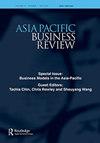The role of cultural diversity in creating value: a case study of South Korea’s pop band BTS
IF 1.9
4区 管理学
Q3 BUSINESS
引用次数: 1
Abstract
ABSTRACT Globalization has heightened the significance of cultural diversity. Embracing cultural diversity within an organization provides a number of benefits, such as enhanced creativity and a comprehensive understanding of customer information, which all contribute to effective decision making in response to market dynamics. This article examines a case study of BTS, a South Korean pop band, and its efforts to promote cultural diversity. BTS is the first Asian act to win the top honour at the American Music Awards. The band accumulated six No. 1s on the Billboard Hot 100 in just over a year, an accomplishment achieved only by The Beatles in the 1960s. On its path to success, BTS cultivated a committed fan following, the ARMY (Adorable Representative M.C. for Youth), which has expanded from its humble beginnings to an influential organization with members of various cultural backgrounds. The article focuses on how BTS and its culturally-diverse fan base have co-created value by generating content and distributing it to a broad network, augmenting the band’s awareness and its brand equity. The article provides implications for diversity as not only a good cause but also a practice that can improve an organization’s financial success by fostering a virtuous cycle of mutual benefit between the organization and its customers.文化多样性在创造价值中的作用——以韩国流行乐队防弹少年团为例
本文章由计算机程序翻译,如有差异,请以英文原文为准。
求助全文
约1分钟内获得全文
求助全文
来源期刊

Asia Pacific Business Review
Multiple-
CiteScore
4.40
自引率
13.80%
发文量
70
期刊介绍:
The growth of the Asia Pacific region and the rising presence of its multinationals in world markets has raised a number of questions about the origins of national economic success. Asia Pacific Business Review addresses these key issues and draws together the lessons of the analysis of culture, economies, history, politics and societies in the area, in order to explore business-related phenomena in the Asia Pacific countries, both in their general and specific contexts. The Review is intended for both academics and interested observers, contains the contributions of recognized experts, and is essential to anyone seeking the latest research on Asia Pacific business in a readily available, approachable form. We welcome articles which deal with nations and societies in the Asia Pacific region, namely those in East Asia and South-East Asia (but not South Asia), including those in APEC and ASEAN, individually or comparatively. Of interest also are contributions on the Asia Pacific economies, comparing those inside with those outside, or those investing in it. We do not, however, publish papers based solely on countries from outside the region.
 求助内容:
求助内容: 应助结果提醒方式:
应助结果提醒方式:


